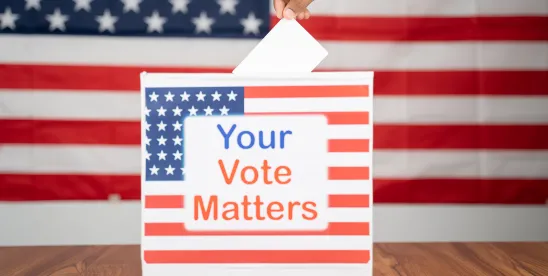With Election Day quickly approaching, it is the right time for employers to refresh themselves on the various protections that may exist for their employees when it comes to voting and other political activities. Below is an overview of employees’ rights related to voting and other political activities leave, as well as protections for political speech and activity both in and outside the workplace.
Voting Leave Laws
Approximately thirty states require that employers provide their employees with some form of time off to vote. Twenty-one of these states require that the leave be paid. The exact contours of these laws – such as the amount of leave, notice requirements, and whether there is an exception when the employee has sufficient time outside of working hours to vote – vary by state. For example:
- In New York, employers must provide leave to employees who do not have sufficient time outside of working hours to vote. An employee is deemed to have sufficient time to vote if the polls are open for four consecutive hours before or after the employee’s shift. Employees who do not have such a four-hour window are eligible to take the amount of leave that will – when added to their voting time outside working hours – enable them to vote, up to two hours of which must be without loss of pay. Employees may take time off for voting only at the beginning or end of their shift, as designated by the employer, unless otherwise mutually agreed to between the employee and employer. Employees are required to notify their employer that working time off to vote is needed between two and ten working days before the election.
- Similarly, in California, employees are entitled to sufficient time off to vote, up to two hours of which must be paid. Unless the employer and employee agree otherwise, the employee must take the leave at the beginning or end of the employee’s shift, whichever allows the most time to vote and the least time off from work. Employees are required to provide notice that time off to vote is needed at least two working days before the election.
- In the Washington, D.C., employees are entitled to up to two hours of paid leave to vote in either an election held in D.C. if the employee is eligible to vote in D.C., or in an election held in the jurisdiction in which the employee is eligible to vote. Employees must submit requests for leave a reasonable time in advance of the election date. Employers may specify the hours during which employees may take leave to vote, including requiring employees to vote during the early voting period or vote at the beginning or end of their shift during early voting or election day.
- In Illinois, employers must provide two hours of paid voting leave to employees whose shifts begin less than two hours after the opening of the polls and end less than two hours before the closing of the polls. Employees must provide notice of the need for leave before the day of the election.
- In Maryland, employees are entitled to up to two hours of paid voting leave, unless the employee has at least two non-working hours to vote while the polls are open. Employees must furnish proof to their employers that they either voted or attempted to vote, which can be in the form of a receipt issued by the State Board of Elections.
Certain states, includingNew York, California, and Washington, D.C., require that employers post a notice of an employee’s right to take leave in a conspicuous location before the election. Sample notices have been published by the New York State Board of Elections, the California Secretary of State, and D.C. Board of Elections.
Other Political Leave Laws
Some states require that employers provide leave for political-related reasons beyond just voting. For example:
- Alabama, Delaware, Illinois, Kentucky, Nebraska, Ohio, Virginia, and Wisconsin require that certain employers provide unpaid leave for employees to serve as election judges or officials on Election Day. In Minnesota, employees are entitled to paid leave for this reason; however, employers may reduce an employee’s salary or wages by the amount the employee receives as compensation for their service as an election judge.
- Minnesota and Texas require that certain employers provide employees with unpaid leave to attend party conventions and/or party committee meetings.
- Connecticut, Iowa, Maine, Nevada, Oregon, South Dakota, and Vermont require that certain employers provide employees with an unpaid leave of absence to serve as elected members of state government. In Iowa, employees are also entitled to leave to serve in a municipal, county, or federal office.
- In Vermont, employees may take unpaid leave to vote in annual town hall meetings.
Some of these laws only apply to larger employers. For example, in Nevada, employers with at least fifty employees are required to provide leave for employees to serve as members of the state legislature. State laws also vary with respect to the amount of notice that employees must provide to their employers in order to be eligible for leave.
Political Speech in the Workplace
In our current political climate, many employers are concerned with what steps they can take regarding political speech and activity in the workplace. When these discussions or activities occur during working hours, they have the potential to negatively impact performance, productivity, or even possibly cross the line into bullying or unlawful harassment.
When employees publicly attend political rallies or support causes on social media, they may also (intentionally or not) create an actual, or perceived, conflict of interest with their employer. The complicated question of what exactly employers can do around employee political speech and activity is governed by various sources of law, some of which is discussed below.
Additionally, for employers with designated tax statuses, certain political speech can give pose risk to an organization’s tax-exempt status. Many tax exempt-organizations are subject to significant restrictions on lobbying and political activities. For example, 501I(3) organizations risk losing their tax-exempt status if they engage in political campaign activities or if a substantial part of its activities involves lobbying. Speech by an employee that constitutes political campaign or lobbying activity risks being attributed to an organization if an employee’s speech is seen as representative of the organization and being ratified by the organization. For example, if an employee urges their social media followers to contact their state representative about proposed legislation, this risks carrying the inference that the employee was speaking on behalf of the organization.
Employee “Free Speech”
There is no general right to “free speech” in a private sector workplace. Because the U.S. Constitution is primarily concerned with state actors, the First Amendment does not prevent private employers from prohibiting or restricting political speech in the workplace. Therefore, subject to certain exceptions discussed below, private sector employers are generally able to enact prohibitions around discussing politics at work and discipline employees for violating such policies.
However, as noted, an employer’s ability to restrain political speech in the workplace comes with some restrictions. At the federal level, Section 7 of the National Labor Relations Act (“NLRA”), which applies to both unionized and non-union employees, protects certain “concerted activities” of employees for the purposes of “mutual aid or protection.” Political speech or activity that is unrelated to employment, such as an employee distributing pamphlets generally encouraging co-workers to vote for a candidate or support a political party, would not likely be covered or protected by the NLRA. The NLRA therefore does not universally prevent employers from prohibiting political discussions or activities in the workplace.
However, political speech may be protected by the NLRA when it relates to the terms or conditions of employment, such as communicating about wages, hours, workplace safety, company culture, leaves, and working conditions. Therefore, an employee encouraging co-workers to vote for a candidate because the candidate supports an increase in the minimum wage might claim to come under the protection of the NLRA.
State laws may also place certain limitations on employer attempts to restrict employee political speech. For example, Connecticut law prohibits employers from taking adverse action against employees for exercising their First Amendment rights, provided that such activity does not interfere with the employee’s job performance or the employment relationship.
Lawful Outside Activity/Off-Duty Conduct
Many states have laws that prohibit adverse action against employees based on lawful activities outside the workplace, which may include political activities. For example:
- In approximately a dozen states, employers are prohibited from preventing employees from participating in politics or becoming candidates for public office. New York Labor Law § 201-d prohibits employers from discharging or otherwise discriminating against employees because of their “political activities outside of working hours, off of the employer’s premises and without use of the employer’s equipment or other property, if such activities are legal.” Political activities include (1) running for public office, (2) campaigning for a candidate for public office, or (3) participating in fund-raising activities for the benefit of a candidate, political party, or political advocacy group. Similar laws exist in California, Louisiana, and Minnesota, among other states.
- Other states – including Delaware, Florida, Massachusetts, and New Jersey– prohibit employers from attempting to influence an employee’s vote in an election. In Florida, “[i]t is unlawful for any person … to discharge or threaten to discharge any employee … for voting or not voting in any election, state, county, or municipal, for any candidate or measure submitted to a vote of the people.” A dozen or so states approach this issue in a more limited fashion by prohibiting employers from attaching political messages to pay envelopes.
- At least two states, Illinois and Michigan, prohibit employers from keeping a record of employee’s associations, political activities, publications, or communications without written consent.
- Washington, D.C. prohibits discrimination in employment on the basis of political affiliation. Despite its seemingly broad scope, this statute has been interpreted to only protect political party membership and not (1) membership in a political group, or (2) other political activities, such as signing a petition.
These laws vary considerably from state to state, so it is important for employers to consult the laws when considering policies or rules around employee political activity.
* * *
As the election approaches and early voting takes place, employers should review the applicable laws for each jurisdiction in which they operate and ensure that their policies and practices are compliant. Employers should also ensure that managers are well versed in the employer’s policies around voting and political speech and activities so that they can properly respond as situations arise.






 />i
/>i
